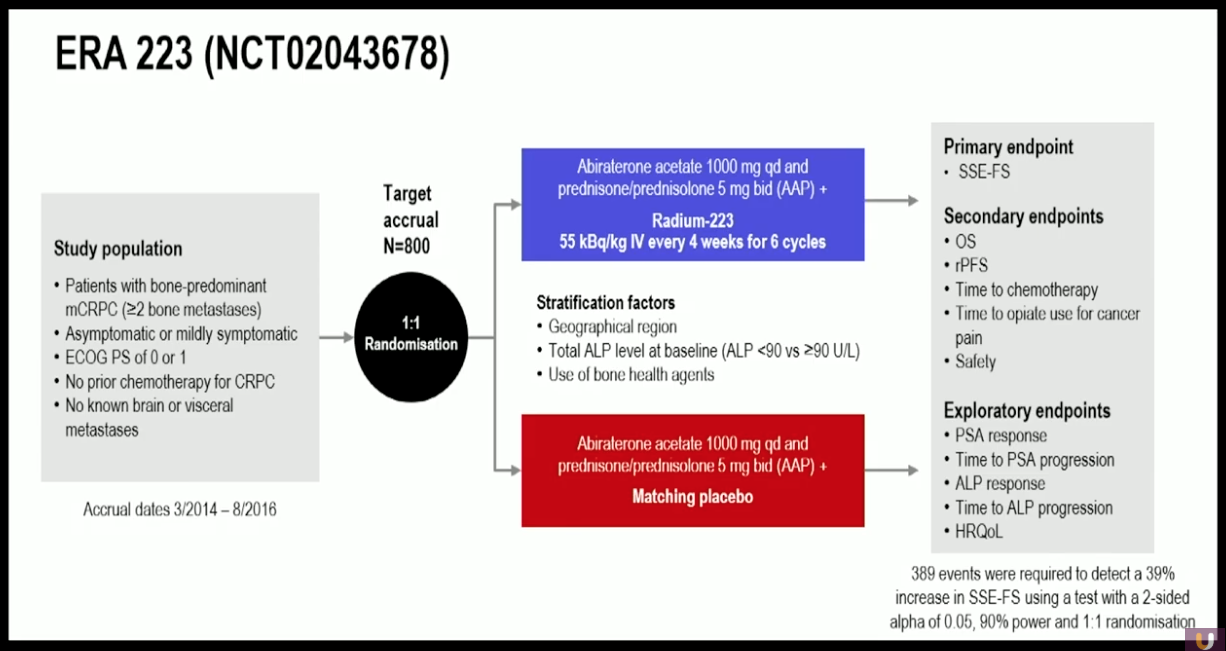Phillip J. Koo, MD, presented “Update on Radiopharmaceuticals: Choosing a Companion Drug to Radium-223” during the 29th Annual International Prostate Cancer Update on January 26, 2019 in Beaver Creek, Colorado.
How to cite: Koo, Phillip J. “Update on Radiopharmaceuticals: Choosing a Companion Drug to Radium-223” January 26, 2019. Accessed Jul 2025. https://grandroundsinurology.com/update-on-radiopharmaceuticals-choosing-a-companion-drug-to-radium-223/
Update on Radiopharmaceuticals: Choosing a Companion Drug to Radium-223 – Summary:
Phillip J. Koo, MD, reviews the data evaluating the use of radium-223 in combination with AR inhibitors for treating patients with CRPC. He discusses findings from the ERA 223 trial and the issues with this combination it highlighted, especially regarding bone health.
Abstract:
When the ALSYMPCA trial evaluated the efficacy and safety of radium-223 in patients with castration-resistant prostate cancer (CRPC) and symptomatic bone metastases, it demonstrated the first instance of a radium-based pharmaceutical improving overall survival. These results, as well as the mechanism of action of radium-223, positioned it as a potential option in combination therapy, especially in combination with androgen receptor (AR) inhibitors. An early access trial done after the ALSYMPCA study showed that the use of abiraterone and enzalutamide concomitantly with radium-223 was safe, and may also provide a survival benefit. The eRADicAte study also evaluated the layering of radium-223 and abiraterone in CRPC patients and showed clinically meaningful improvements in quality of life and bone pain.
With the precedent of these trials in mind, the overall urologic community foresaw the ERA 223 trial as being positive. This trial, beginning in March 2014, investigated abiraterone plus radium-223 as compared to abiraterone alone in metastatic CRPC patients.
However, in November 2017, an important drug warning letter called for the un-blinding of this study. The warning was due to an Independent Data Monitoring Committee (IDMC) recommendation. Their preliminary data had found an increased incidence of deaths and fractures in the combination arm.
In its final recommendations, ERA 223 advised against using abiraterone and radium-223 in combination. Despite this, there is still much physicians can take away from this study. Most importantly, it highlights the need to factor in bone health when treating these patients.
About the International Prostate Cancer Update
The International Prostate Cancer Update (IPCU) is an annual, multi-day CME conference focused on prostate cancer treatment updates. The conference’s faculty consists of international experts, and the event caters to urologists, medical oncologists, radiation oncologists, and other healthcare professionals. Topics encompass prostate cancer management, from diagnosis to treating advanced and metastatic disease. Dr. Koo presented this lecture during the 29th IPCU in 2019. Please visit this page in order to learn more about future IPCU meetings.
ABOUT THE AUTHOR
Phillip J. Koo, MD, is the Chief of Diagnostic Imaging at the Banner MD Anderson Cancer Center in Phoenix, Arizona. Prior to this, he was Chief of Nuclear Medicine and Associate Professor of Radiology at the University of Colorado School of Medicine in Aurora, Colorado. He completed his fellowship at the Harvard Medical School Joint Program in Nuclear Medicine in Boston, Massachusetts. Dr. Koo is a diplomate of both the American Board of Radiology (ABR) and American Board of Nuclear Medicine(ABNM).






